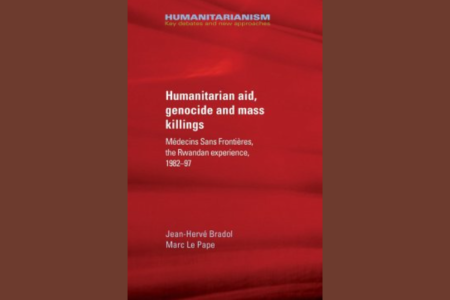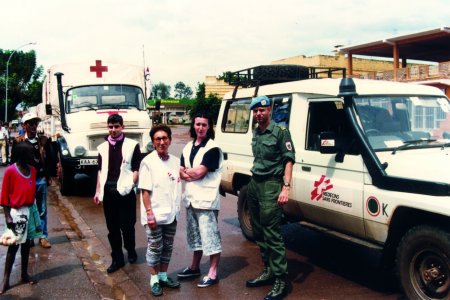
Genocide from an historical, legal and political standpoint
Jean-Hervé Bradol
The publication of the journalist Judi Rever’s book, In Praise of Blood, on the crimes committed by the Rwandan Patriotic Front’s armed rebellion has rekindled discussion over the existence of a “double genocide”, one committed against the Tutsis under the orders of Rwanda’s interim government which took power in April 1994 following the assassination of President Habyarimana, and the other against the Hutus by the Rwandan Patriotic Front (RPF) which seized power in July 1994. There is little or no controversy about the reality of the genocide of the Tutsis in the world of Rwandan studies, but the claim that the Hutus were in turn victims of genocide sparks reactions as violent as they are confused. The cause of this confusion can be found in the different definitions of a term used in at least three fields: history, law and politics.
From an historical standpoint, the extermination of the Rwandan Tutsis can be likened to two similar events: the genocide of the Armenians in Turkey during the First World War and that of the European Jews during the Second World War. In all three cases, the order “Kill them all” was given by the government and executed on a very large scale. When the RPF came to power, it could not give the order to “Kill all the Hutus” for a very simple reason: Hutus made up nine-tenths of the Rwandan population. If there had been a double genocide, Rwanda itself would have disappeared alongside its population.
The law has approached the issue of genocide from a different angle in judging the crimes perpetrated during the conflict in former Yugoslavia. The RPF is accused of giving the order to “kill all the Hutus”, but only at a given point in time and in a specific area rather than throughout the country. This order is comparable to those given by Serb leaders against groups of Bosnian Muslims, notably the massacres in Srebrenica in 1995, events which have been described as acts of genocide on numerous occasions by the International Tribunal tasked with bringing the perpetrators to account. From a legal standpoint, the notion of a "double genocide" is therefore admissible, in which case the leaders of the RPF can be charged with genocide for acts committed over the period 1990-1997. Furthermore, if this legal precedent is confirmed, the leaders of the French government could be accused of complicity in genocide because of its support to its Rwandan allies during the period 1990-1993. Indeed, there would no longer be any need to determine exactly what French soldiers were doing in the spring of 1994 at the height of the extermination of the Tutsis. Its support to the Rwandan armed forces, in full knowledge of the fact that they were already conducting targeted massacres of Tutsis prior to the spring of 1994, is sufficient to argue complicity according to the “Srebrenica precedent”.
The political dimension only adds to the confusion. Since the end of the 20th century, there have been countless demands for the recognition of genocides. As the mother of all crimes, victims of genocide are seen as embodying the absolute victim. Today, on every continent, dozens of political movements are seeking to capitalise on this. Indeed, the resultant political “status” offers an advantage, not for the victims themselves, but for the political actors claiming to defend their cause. As self-proclaimed representatives of the "victims of all victims", they hope to become politically “untouchable”, whatever crimes they may have committed. Today, the leaders of Israel and Rwanda exploit this status shamelessly: “Any violence we commit, whatever form it may take, is justifiable self-defence against an enemy seeking to exterminate us”. Thus, the Israeli government is able to pursue its colonial enterprise at the expense of the Palestinians and the Rwandan government has been allowed to deprive Rwandans of their freedom for the last 25 years - without their mass crimes ever causing either of them to lose the support of their international allies.
Giving the law has the last word in this debate creates two problems. According to the Convention on the Prevention and Punishment of the Crime of Genocide (9 December 1948), any material or symbolic violence committed against a national, ethnical, racial or religious group identified as such becomes an act of genocide. By using this very inclusive definition, there is a risk of events of a very disparate nature being included in the same category of crime. We know the danger of this kind of all-encompassing approach: if everything is serious then nothing is serious. Furthermore, mass crimes targeting a supposed political allegiance rather than national, ethnical, racial or religious affiliation are excluded from the 1948 Convention. Consequently, from a legal standpoint, a large proportion of the crimes committed under Stalin, for example, cannot be defined as genocide.
At best, applying the legal definition of genocide would result in a concentration in the same criminal category of diverse crimes of varying degrees of gravity. At worst, the most murderous political repressions would never feature among the most serious crimes. Despite its commendable intention of putting an end to exterminatory practices, there is no evidence that the addition in 1948 of the category of genocide to the two pre-existing categories, war crimes and crimes against humanity, has made a significant contribution to the prevention and punishment of mass crimes.
To cite this content :
Jean-Hervé Bradol, “Genocide from an historical, legal and political standpoint”, 5 avril 2018, URL : https://msf-crash.org/en/blog/war-and-humanitarianism/genocide-historical-legal-and-political-standpoint
If you would like to comment on this article, you can find us on social media or contact us here:
Contribute



Add new comment